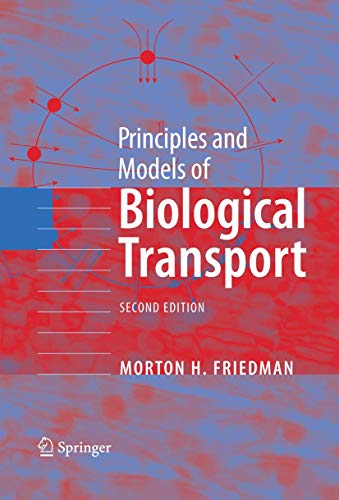Verwandte Artikel zu Principles and Models of Biological Transport

Zu dieser ISBN ist aktuell kein Angebot verfügbar.
Alle Exemplare der Ausgabe mit dieser ISBN anzeigen:Die Inhaltsangabe kann sich auf eine andere Ausgabe dieses Titels beziehen.
Principles and Models of Biological Transport, 2nd ed.
Morton H. Friedman
Transport processes are ubiquitous in the living organism, underlying nerve conduction and muscle contraction, digestion, kidney function and the nourishment of every cell in the body. The mechanisms by which these processes take place, and the models that describe them, are the subject of Principles and Models of Biological Transport. Beginning with the principles of thermodynamics and the organization of the cell, the text discusses each of the transport mechanisms found in the organism, their structure at the molecular level, their function and features, and their integration into tissues and organs.
Courses based on the text will be of interest to students who wish to understand the fundamentals of biological transport and the models that describe it. It will provide readers with the knowledge necessary to interpret transport experiments in biological systems and to predict performance or behavior from transport data. Advanced undergraduates or graduate students in Biomedical Engineering or Physiology and Biophysics will find this book useful, as will other engineers (Mechanical, Chemical, Environmental) who have some familiarity with biology, or Biology students who prefer a more quantitative approach to the subject.
The new edition includes numerous figures and references, and problems at the end of each chapter. It is supported by an open web site http://biotrans.pratt.duke.edu/ to facilitate its use in class. The web site allows faculty users to share syllabi based on the text and to post additional problems that can serve as illustrations or be given to students; all users are welcome to note corrections and suggest improvements in the text, and to add new material to the knowledge base. The web site is intended to support a "community of the book" that can maintain its currency and value into the future.
About the author:
Morton H. Friedman is Professor and former Chair of the Biomedical Engineering Department at Duke University and Professor of Medicine in the Duke University Medical Center. He originated the biological transport course in the Department of Biomedical Engineering at Johns Hopkins University and taught at The Ohio State University prior to arriving at Duke. He is a Fellow of the American Association for the Advancement of Science, the Biomedical Engineering Society, and the American Society of Mechanical Engineers, a Founding Fellow of the American Institute for Medical and Biological Engineering, and recipient of the H.R. Lissner medal and the Richard Skalak award of the American Society of Mechanical Engineers.
„Über diesen Titel“ kann sich auf eine andere Ausgabe dieses Titels beziehen.
- VerlagSpringer
- Erscheinungsdatum2008
- ISBN 10 0387792392
- ISBN 13 9780387792392
- EinbandTapa dura
- Auflage2
- Anzahl der Seiten510
Neu kaufen
Mehr zu diesem Angebot erfahren
Versand:
EUR 32,99
Von Deutschland nach USA
Beste Suchergebnisse beim ZVAB
Principles and Models of Biological Transport
Buchbeschreibung Buch. Zustand: Neu. Druck auf Anfrage Neuware - Printed after ordering - Focus, Organization, and Content This book, like the first edition, deals with the mass transport processes that take place in living systems, with a focus on the normal behavior of eukaryotic cells and the - ganisms they constitute, in their normal physiological environment. As a consequence of this focus, the structure and content of the book differ from those of traditional transport texts. We do not start with the engineering principles of mass transport (which are well presented elsewhere) and then seek biological applications of these principles; rather, we begin with the biological processes themselves, and then - velop the models and analytical tools that are needed to describe them. This approach has several consequences. First of all, it drives the content of the text in a direction distinctively different from conventional transport texts. This is - cause the tools and models needed to describe complex biological processes are often different from those employed to describe more well-characterized inanimate systems. Many biological processes must still be described phenomenologically, using me- odologies like nonequilibrium thermodynamics. Simple electrical analogs employing a paucity of parameters can be more useful for characterization and prediction than complex theories based on the behavior of more well-defined systems on a laboratory bench. By allowing the biology to drive the choice of analysis tools and models, the latter are consistently presented in the context of real biological systems, and analysis and biology are interwoven throughout. Artikel-Nr. 9780387792392
Weitere Informationen zu diesem Verkäufer | Verkäufer kontaktieren

